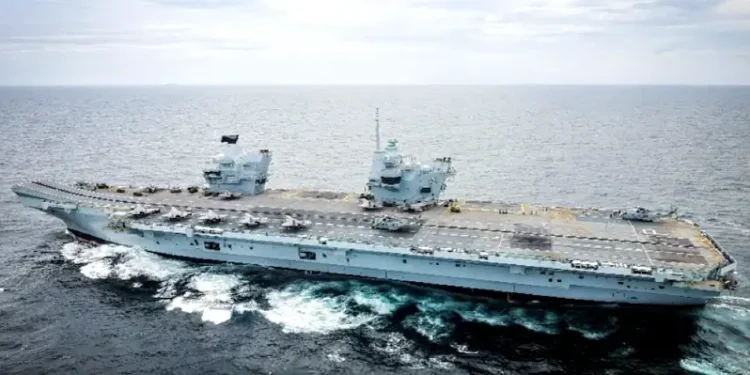The UK-led Carrier Strike Group, spearheaded by HMS Prince of Wales, has commenced operations in the Indo-Pacific as part of Operation Highmast.
This deployment aims to enhance UK security and trade, involving joint exercises with regional partners and port visits to key Asian cities, ultimately supporting economic growth and reinforcing global security commitments.
Strengthening Economic Ties
The deployment of the Carrier Strike Group is not just a military maneuver but also a strategic economic initiative. By visiting ports in Singapore, Indonesia, Japan, and South Korea, the UK aims to bolster trade relations and showcase British industry.
These activities are expected to directly support UK businesses, particularly in the defence sector, creating job opportunities and fostering economic growth.
Strategic Military Presence
The inclusion of two F-35B squadrons highlights the UK’s advanced naval air power and readiness for warfighting. This deployment underscores the UK’s commitment to maintaining a strong military presence in strategically important regions like the Indo-Pacific.
The collaboration with allied nations such as Canada, Norway, Spain, and New Zealand further emphasizes international cooperation for global security.
Collaborative Efforts
The Carrier Strike Group’s multinational composition reflects the UK’s dedication to strengthening global partnerships.
Joint exercises with regional allies aim to enhance military readiness while fostering diplomatic ties. A planned port visit to Darwin will further develop the AUKUS alliance between Australia, the UK, and the US.
Economic Opportunities
- Port visits in Asia will boost trade opportunities for UK businesses.
- Trade demonstrations will highlight British industry capabilities.
- Potential partnerships between UK tech startups and Asian firms could emerge.
- The mission supports job creation within defence-related industries.
Balancing Priorities
This deployment aligns with the UK government’s commitment to increase defence spending to 2.6% of GDP. While this reflects a focus on national security and economic growth, it also raises questions about resource allocation.
The public may debate whether international commitments should take precedence over domestic needs such as healthcare or education funding.
Leader Comments
Minister for the Armed Forces, Luke Pollard said:
“I am delighted that our Carrier Strike Group and 4,000 Service Personnel, are now operating in the Indo-Pacific region. Working with our Allies and partners, to keep Britain secure at home and strong abroad.
This isn’t just about hard power; the upcoming exercises and port visits are about building influence and boosting trade opportunities both for defence and other sectors of our economy which will deliver British jobs and growth, and delivers on the Government’s Plan for Change.”
Commodore James Blackmore, Commander CSG said:
“The deployment sends a powerful message that the UK and its allies are committed to security and stability in the Indo-Pacific region. It’s a privilege to lead our sailors, marines, soldiers and aircrew as we demonstrate warfighting capability.”
Additional Reading
To Sum Up
The Carrier Strike Group’s deployment signifies a pivotal moment for UK defence strategy in the Indo-Pacific region.
As it strengthens international alliances and boosts economic prospects through trade initiatives, this mission underscores Britain’s dual focus on enhancing global security while promoting domestic economic interests through strategic partnerships abroad.
Sources: UK Government, Naval News, IISS, Ministry of Defence and Luke Pollard MP.
Prepared by Ivan Alexander Golden, Founder of THX News™, an independent news organization delivering timely insights from global official sources. Combines AI-analyzed research with human-edited accuracy and context.









